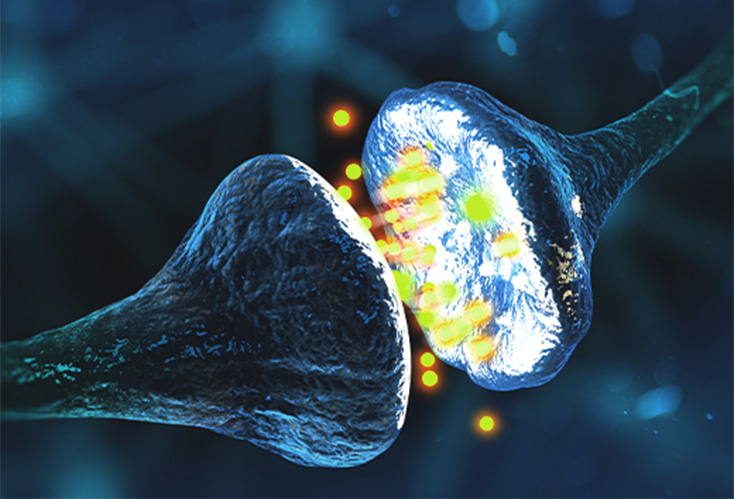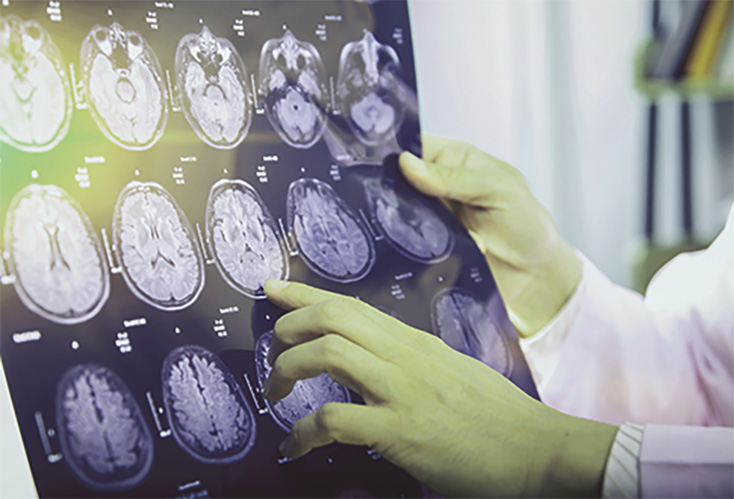Commitment to Alzheimer’s and neurodegenerative diseases
A rapidly aging world population is expected to push the number of dementia cases globally to 152 million by 2050 - triple the current figure.1 Alzheimer’s disease (AD) is the most common form of dementia, representing as many as 60-70% of all cases,2 and is a general term to describe a progressively debilitating loss of memory, cognition and functional ability.
Over the last nearly 20 years, Grifols has invested over 150 million euros in solutions to diagnose and treat the multifaceted etiology of Alzheimer’s, part of a high-octane innovation engine that’s driving new potential treatments for neurological conditions as well as other therapeutic areas. Today our Alzheimer’s portfolio covers discovery, research and large clinical activities such as the breakthrough AMBAR® program.
AMBAR®: the power of plasma exchange
Albumin has emerged as a key factor in healthy function across multiple organ systems. In addition to maintaining intravascular volume (which explains its main use as a blood-expansion treatment), the plasma protein is the main transporter of metabolites, drugs, metals, and other compounds in the body that keep it functioning correctly. Albumin is also the main extracellular antioxidant in the body and has key immunomodulatory effects.3 Recognizing that most of the amyloid beta – one of the proteins that accumulates in the brains of patients with AD – is bound to albumin and circulates in plasma,4 we developed the AMBAR® (Alzheimer Management by Albumin Replacement) program.
AMBAR® is a multimodal approach designed to slow the disease’s progression. It consists of two vitally linked steps. First, therapeutic plasma exchange (TPE) flushes out pathological substances such as amyloid-beta, a protein that binds to the plasma protein albumin and whose accumulation in the brain is believed to contribute to AD. Then fresh albumin, capable of capturing more amyloid beta, is infused to repeat the restorative process. Patients also can potentially benefit from albumin’s antioxidant capacity as well as anti-inflammatory and immunomodulatory properties.
Our pioneering AMBAR® clinical study has shown a tendency to safely abate the cognitive and functional progression of mild-to-moderate Alzheimer’s in patients.5-7 The innovative AMBAR® program is backed by nearly 20 years of rigorous scientific research at Grifols, which continues to investigate Alzheimer’s disease, a devastating condition affecting millions of patients around the world.

Vaccine for Alzheimer’s Disease
While plasma’s therapeutic potential takes center stage in AMBAR®, Grifols is developing an active non-plasma immunotherapy through its Araclon Biotech subsidiary. Araclon is developing an anti-amyloid-beta vaccine – ABVac40 – designed to mount a specific immune response against amyloid beta 40 peptide (Ab40) in its soluble form,8 thus avoiding any interaction at the level of the cell membrane, to treat early-stage Alzheimer’s.
Principal data analyzed from a phase 2 trial has shown an excellent safety and tolerability profile.8 It has also demonstrated a high immune response in patients, characterized by a simultaneous rise in the anti-Ab40 titers and levels of this Ab40 peptide in plasma.
We’re continuing to analyze secondary variable results related to efficacy as well as post hoc analyses to further advance development of the vaccine.

Facilitating early Alzheimer’s diagnosis
Araclon Biotech has also developed two plasma CE-marked tests to predict the risk of Alzheimer’s. Through mass spectrometry (ABtest-MS) and the ELISA technique (ABtest-IA), the tests quantify accurately and robustly the levels of Ab42 and Ab40 found in plasma. These non-invasive and cost-effective diagnostic tools would facilitate early intervention and disease management when patients still have significant or nearly complete cognitive abilities.
Both tests are advantageous compared with the commonly used invasive methods to take cerebrospinal fluid, and over expensive imaging techniques to evaluate the amyloid-beta burden in the brain. Simplified testing would further accelerate the recruitment for clinical trials of new treatments, reducing the screening failure rate and associated costs.
Revealing early biomarkers of Parkinson’s disease (PD)
Despite decades of research and advancements in treatment, our understanding of the underlying causes of Parkinson’s disease (PD) remains limited, which hinders diagnosis and effective treatment.
Our Alkahest group is using artificial intelligence and data analysis to study thousands of plasma samples from the past 10 years. Thanks to a $21 million grant from The Michael J. Fox Foundation for Parkinson’s Research (MJFF), we're working to find biological signals that may indicate an increased chance of developing Parkinson's disease long before symptoms appear, which could lead to new ways to detect and treat the disease.
CHRONOS-PD: Plasma Science in Parkinson’s Research
Seeking early biological signs of disease.
1 GBD 2019 Dementia Forecasting Collaborators. Estimation of the global prevalence of dementia in 2019 and forecasted prevalence in 2050: an analysis for the Global Burden of Disease Study 2019. Lancet Public Health. 2022;7(2):e105-e125. doi: 10.1016/S2468-2667(21)00249-8
2 Alzheimer's Disease International, Worlds Alzheimer's Report 2015. Accessed September 22, 2022. https://www.alz.org/Alzheimers-dementia/what-is-dementia
3 Fanali G, di Masi A, Trezza V, Marino M, Fasano M, Ascenzi P. Human serum albumin: from bench to bedside. Mol Aspects Med. 2012;33(3):209-90. doi: 10.1016/j.mam.2011.12.002
4 Biere AL, Ostaszewski B, Stimson ER, Hyman BT, Maggio JE, Selkoe DJ. Amyloid beta-peptide is transported on lipoproteins and albumin in human plasma. J Biol Chem. 1996;271(51):32916-22. doi: 10.1074/jbc.271.51.32916
5 Boada M, López OL, Olazarán J, et al. Neuropsychological, neuropsychiatric, and quality-of-life assessments in Alzheimer's disease patients treated with plasma exchange with albumin replacement from the randomized AMBAR study. Alzheimers Dement. 2021:1-11. doi:10.1002/alz.12477
6 Costa M, Páez A. Emerging insights into the role of albumin with plasma exchange in Alzheimer's disease management. Transfus Apher Sci. 2021;60(3):103164. doi:10.1016/j.transci.2021.103164
7 Nicodemus-Johnson J, Hendrix SB, Barceló M, et al. Complementary analyses of the AMBAR trial: individual items of CDR and ADAS-Cog12 in Alzheimer’s disease patients treated with plasma exchange with albumin replacement. Alzheimers Dement. 2021;17(suppl 9):e053717. doi: https://doi.org/10.1002/alz.053717
8 Molina E, Castillo S, Lacosta AM, Allué JA, Fandos N, Romero J, Montañés M, Sarasa L, Terencio J, Boada M, Sarasa M. Update Phase 2 Study of ABVAC40, an active vaccine anti-AΒ40 in patients with mild cognitive impairment or very mild Alzheimer’s Disease. Poster presented at: Clinical Trials in Alzheimer’s Disease: November 9-12; Boston, MA